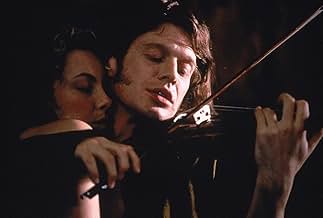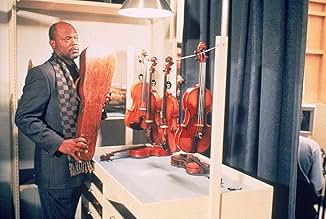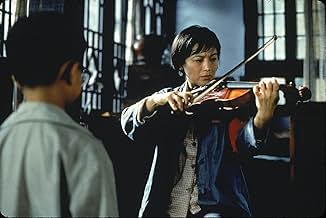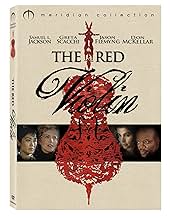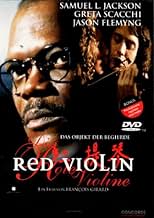IMDb-BEWERTUNG
7,6/10
35.263
IHRE BEWERTUNG
Eine rote Geige weckt Leidenschaft, bahnt sich ihren Weg durch drei Jahrhunderte über mehrere Besitzer und Länder und landet schließlich bei einer Auktion, wo sie möglicherweise einen neuen ... Alles lesenEine rote Geige weckt Leidenschaft, bahnt sich ihren Weg durch drei Jahrhunderte über mehrere Besitzer und Länder und landet schließlich bei einer Auktion, wo sie möglicherweise einen neuen Besitzer findet.Eine rote Geige weckt Leidenschaft, bahnt sich ihren Weg durch drei Jahrhunderte über mehrere Besitzer und Länder und landet schließlich bei einer Auktion, wo sie möglicherweise einen neuen Besitzer findet.
- Regie
- Drehbuch
- Hauptbesetzung
- 1 Oscar gewonnen
- 20 Gewinne & 19 Nominierungen insgesamt
Empfohlene Bewertungen
The Red Violin is the saga of spirit and soul as they press onward through time. The adventure begins with Anna, a young woman whose only child brings about her untimely death. A gift of a violin to be given to the babe becomes host to Anna's spirit. The Red Violin narrowly escapes the grips of greed, ignorance, and vengeful lust as she is passed from hand to hand of those who would have her. She wanders about the globe until at last she is exonerated by the one man who knows the truth that she holds within her wooden belly.
In spite of the death and despair, the film is truly positive. It teaches us to appreciate people from all walks of life. From the violin maker of the 16th century who made the Red Violin for the bittersweet arrival of his baby son, we travel through time with the violin to the Chinese Communist Party who spelled out certain death to any instrument that may threaten the ideals of the collective. In our travels, we learn the dark and sordid side to each person, but we also learn that to create a shadow there must be light. That light, or hope, that the people shed is what gives the violin her vitality and will to survive.
A truly magnificent film, The Red Violin inspired me to recollect my own past I shared with my aged upright piano; the certain spiritual vibrations I felt while playing a ragtime melody. Suddenly, memories came rushing back to me tenfold. I recalled the times as a young girl I would listen as my father played his rendition of Scott Joplin's Maple Leaf Rag. Wiping a tear from my eye, I remembered how long ago that truly was; how my piano shaped and molded me, as I shaped and molded it. I am left wondering where my beloved piano is now. Who is influencing his instrumental life? In the end, what stories will he have to tell, and will they be of me
Take the journey of the Red Violin. Visit other lands and other times. Feel the strings of life against your fingers; the bow of spirit in your palm. Rest your chin against the weathered wood of wisdom. Listen closely and hear the music that is the gentle rhythm of time and change. See the film to learn about music; to learn about history; to learn the boundless raptures of the spirit. Perhaps, as I, you will learn just a little more about yourself.
In spite of the death and despair, the film is truly positive. It teaches us to appreciate people from all walks of life. From the violin maker of the 16th century who made the Red Violin for the bittersweet arrival of his baby son, we travel through time with the violin to the Chinese Communist Party who spelled out certain death to any instrument that may threaten the ideals of the collective. In our travels, we learn the dark and sordid side to each person, but we also learn that to create a shadow there must be light. That light, or hope, that the people shed is what gives the violin her vitality and will to survive.
A truly magnificent film, The Red Violin inspired me to recollect my own past I shared with my aged upright piano; the certain spiritual vibrations I felt while playing a ragtime melody. Suddenly, memories came rushing back to me tenfold. I recalled the times as a young girl I would listen as my father played his rendition of Scott Joplin's Maple Leaf Rag. Wiping a tear from my eye, I remembered how long ago that truly was; how my piano shaped and molded me, as I shaped and molded it. I am left wondering where my beloved piano is now. Who is influencing his instrumental life? In the end, what stories will he have to tell, and will they be of me
Take the journey of the Red Violin. Visit other lands and other times. Feel the strings of life against your fingers; the bow of spirit in your palm. Rest your chin against the weathered wood of wisdom. Listen closely and hear the music that is the gentle rhythm of time and change. See the film to learn about music; to learn about history; to learn the boundless raptures of the spirit. Perhaps, as I, you will learn just a little more about yourself.
I had never heard of this movie until I heard about it on the radio. I listen to classical music, and the staion was praising Joshua Bell (an ohio native) on his perfomance of the music. I was curious and saw it when it came on video. not only did i fall in love with the movie itself, but also the music. it was soothing, passionate, and brutal all at the same time. Many people I have talked to have said that Le Violon Rouge was just some crappy indie movie. However, the music is as beautiful as the plot. The storyline and the way it was presented in the form of different people who wanted the violin for different reasons was not so much genius, but different and fitting.
10bjones
I thought this might be one of those films that would be "good for me" to see. I was mildly intrigued by descriptions of the story I had read and with the trailer, so I thought to take a chance. I took someone very close to me, an actual violin prodigy. Coincidently, her and I have recently been searching for a decent violin for her that is affordable by actual humans, so we could relate to parts of the plot first-hand. We arrived to a very thin theater in one of those mega-complex theaters, and while everyone was queuing up next-door to see the latest blockbuster from Hollywood I settled into an amazingly comfortable seat with an excellent view and prepared for whatever might come.
I was shocked. This film turned out to be clearly one of the best movie going experiences I have had in ages. We see this as the story unfolds and is creatively told through the reading of the violin makers wife's fortune with a deck of Tarot cards. It is the story of a part of the life of a violin; of the humans who would dare to possess her beauty. A masterpiece of a craftsman's art, it is desired by many for it's acoustic perfection. But, as Tolstoy said, "how complete is the delusion that beauty is goodness." Or more interestingly, from Saint Augustine: "Beauty is indeed a good gift of God; but that the good may not think it a great good, God dispenses it even to the wicked." There seems to be a curse on this instrument as it brings ill to those who manage to possess it. This makes the ending especially eerie.
An original, imaginative and thought provoking story that engaged one's mind as American films almost never do. I will not describe more of the plot, it's far too good to ruin. The memory of this film will be one long treasured.
Oh, as for my guest, the honest-to-God prodigy: she said the music was magnificent (it was) even though a real musician could tell the actors weren't playing, it was well done.
I was shocked. This film turned out to be clearly one of the best movie going experiences I have had in ages. We see this as the story unfolds and is creatively told through the reading of the violin makers wife's fortune with a deck of Tarot cards. It is the story of a part of the life of a violin; of the humans who would dare to possess her beauty. A masterpiece of a craftsman's art, it is desired by many for it's acoustic perfection. But, as Tolstoy said, "how complete is the delusion that beauty is goodness." Or more interestingly, from Saint Augustine: "Beauty is indeed a good gift of God; but that the good may not think it a great good, God dispenses it even to the wicked." There seems to be a curse on this instrument as it brings ill to those who manage to possess it. This makes the ending especially eerie.
An original, imaginative and thought provoking story that engaged one's mind as American films almost never do. I will not describe more of the plot, it's far too good to ruin. The memory of this film will be one long treasured.
Oh, as for my guest, the honest-to-God prodigy: she said the music was magnificent (it was) even though a real musician could tell the actors weren't playing, it was well done.
I saw this film the same day it came highly recommended to me by a coffee shop friend who couldn't stop gushing about it. While this guy is also a member of the Academy and has steered me to some pretty good picks in the past, I walked into the theater fearing the usual letdown that invariably follows going into a film with overly high expectations (i.e. The English Patient, The Truman Show, etc.) This film not only managed to exceed my expectations, it restored my faith in the magic and mystery of cinema altogether.
We start with a rather simple but cleverly structured story about a very unique red violin that emblematically (and quite literally for that matter) takes on the heart and fate of a 16th century Italian woman as it passes across several centuries and continents on its way to the auction block in present day Montreal. The unfolding vignettes reveal more and more about the nature of this instrument and, when strung together in the bigger picture, play out like finely orchestrated movements of a great sonata; each movement plucking out its own stirring and poignant variation on theme. I was so swept up in the majesty and spectacle of this film that it didn't even occur to me until much later that the violin is nothing less than a personification of beauty itself (okay, okay, maybe I'm starting to overly deconstruct things here in retrospect, but the parallels are too perfect to remain unexplored). It's fascinating to watch both the transformative and destructive power of this beauty as it's placed into the hands of a sensitive young boy, a self absorbed musical protege, and a remorseful ring leader of a totalitarian regime. Much praise goes to director Francois Girard in how he refrained from overplaying the social and moral commentary, repeating this theme at mostly an emotional level rather than an intellectual one -- much in the same way that beauty itself, to some degree anyway, defies analytical discussion and belongs in the realm of pure and simple experience. You obviously can't dissect it, as co-writer Don McKellar¹s onscreen character thought to do, and so it remains as it was in it's original form: timeless, magical, elusive. The stuff that pompous nobility and rich collectors the world over will offer a king's ransom for and still never manage to posses in the end.
Performances were good to great all around. It's hard to go wrong with Samuel L. Jackson in a leading role and I appreciated the fact that the actors actually appeared to be playing the violin on camera, as opposed to watching the typical hokey cutaways and cheat shots often associated with onscreen musical performances; nauseating contrivances that always tear down the wall of suspended disbelief with a resounding crash. The costuming, set design and cinematography were absolutely stunning (Oscar nominations soon to follow I'm sure) without taking center stage from the story. I especially loved the amazing period recreations of China and Austria. I felt like I was fully transported in both space and time to these places and walking among people who really belonged there.
Overall I would rate this one as a true film classic on the level of masterpiece. Perhaps this is in part due to my love for music and the undeniable fact that, being the sentimental guy that I am, I'm always a sucker for haunting open-ended films like this where you leave the theater in a half daze, pondering all the implications, mesmerized by the lingering imagery. I'm still speculating about the future of Mr. Moritz and what will ultimately happen when beauty is placed into the hands of our modern world.
We start with a rather simple but cleverly structured story about a very unique red violin that emblematically (and quite literally for that matter) takes on the heart and fate of a 16th century Italian woman as it passes across several centuries and continents on its way to the auction block in present day Montreal. The unfolding vignettes reveal more and more about the nature of this instrument and, when strung together in the bigger picture, play out like finely orchestrated movements of a great sonata; each movement plucking out its own stirring and poignant variation on theme. I was so swept up in the majesty and spectacle of this film that it didn't even occur to me until much later that the violin is nothing less than a personification of beauty itself (okay, okay, maybe I'm starting to overly deconstruct things here in retrospect, but the parallels are too perfect to remain unexplored). It's fascinating to watch both the transformative and destructive power of this beauty as it's placed into the hands of a sensitive young boy, a self absorbed musical protege, and a remorseful ring leader of a totalitarian regime. Much praise goes to director Francois Girard in how he refrained from overplaying the social and moral commentary, repeating this theme at mostly an emotional level rather than an intellectual one -- much in the same way that beauty itself, to some degree anyway, defies analytical discussion and belongs in the realm of pure and simple experience. You obviously can't dissect it, as co-writer Don McKellar¹s onscreen character thought to do, and so it remains as it was in it's original form: timeless, magical, elusive. The stuff that pompous nobility and rich collectors the world over will offer a king's ransom for and still never manage to posses in the end.
Performances were good to great all around. It's hard to go wrong with Samuel L. Jackson in a leading role and I appreciated the fact that the actors actually appeared to be playing the violin on camera, as opposed to watching the typical hokey cutaways and cheat shots often associated with onscreen musical performances; nauseating contrivances that always tear down the wall of suspended disbelief with a resounding crash. The costuming, set design and cinematography were absolutely stunning (Oscar nominations soon to follow I'm sure) without taking center stage from the story. I especially loved the amazing period recreations of China and Austria. I felt like I was fully transported in both space and time to these places and walking among people who really belonged there.
Overall I would rate this one as a true film classic on the level of masterpiece. Perhaps this is in part due to my love for music and the undeniable fact that, being the sentimental guy that I am, I'm always a sucker for haunting open-ended films like this where you leave the theater in a half daze, pondering all the implications, mesmerized by the lingering imagery. I'm still speculating about the future of Mr. Moritz and what will ultimately happen when beauty is placed into the hands of our modern world.
The mystique of violin making has always intrigued me so this film was a big attraction for me going in, and I wasn't disappointed for one second!
OK, first of all, the obvious things that make it special: reality, craft, acting, scoring, and cinematography! It takes only a few seconds to know that this gem did NOT emanate from the money grubbers in Hokeywood California as one more way to titillate teenagers with sex, violence, and computer generated special effects with a subliminal message that sells products. Nope! This film was made by film makers who understand the power of a story well told, and REAL cinema.
Cutting back and forth repeatedly between the present and various disparate periods and places from the past, THE RED VIOLIN forces the viewer to pay attention and most of all... THINK!
The Red Violin is NOT the subject here but a catalyst to stimulate thought about human behavior and how different societies have related to art as we move through the centuries.
The casting was (on the whole) excellent though the choice of Samuel L. Jackson as a learned expert in ancient instruments was not convincing for me personally. And, the NON-ending which is more of a comment on human habits of acquisition than human nobility, was just not what I considered a definitive ending. (Maybe that was the point! "Everything continues endlessly...")
If you go to movies as an excuse to nibble away on munchies and get titillation, well, this one's NOT for you. BUT, if you have the patience to watch and think simultaneously as a great story unfolds, then SEE this film immediately!
OK, first of all, the obvious things that make it special: reality, craft, acting, scoring, and cinematography! It takes only a few seconds to know that this gem did NOT emanate from the money grubbers in Hokeywood California as one more way to titillate teenagers with sex, violence, and computer generated special effects with a subliminal message that sells products. Nope! This film was made by film makers who understand the power of a story well told, and REAL cinema.
Cutting back and forth repeatedly between the present and various disparate periods and places from the past, THE RED VIOLIN forces the viewer to pay attention and most of all... THINK!
The Red Violin is NOT the subject here but a catalyst to stimulate thought about human behavior and how different societies have related to art as we move through the centuries.
The casting was (on the whole) excellent though the choice of Samuel L. Jackson as a learned expert in ancient instruments was not convincing for me personally. And, the NON-ending which is more of a comment on human habits of acquisition than human nobility, was just not what I considered a definitive ending. (Maybe that was the point! "Everything continues endlessly...")
If you go to movies as an excuse to nibble away on munchies and get titillation, well, this one's NOT for you. BUT, if you have the patience to watch and think simultaneously as a great story unfolds, then SEE this film immediately!
Wusstest du schon
- WissenswertesChristoph Koncz (as Kaspar Weiss the orphan virtuoso) was only nine years old when featured in this movie. He is an Austrian-Hungarian classical musician that became an internationally-renowned violinist and conductor.
- PatzerThe substance used to give the violin its color would not actually work in real life. The substance does not mix into varnish, and would quickly coagulate and oxidize to a dark brown or black color if it were actually used as the movie implies.
- Zitate
Charles Morritz: What do you do when the thing you most wanted, so perfect, just comes?
- SoundtracksO Richard! O mon Roi!
from "Richard Coeur de Lion"
Composed by André-Modeste Grétry
Top-Auswahl
Melde dich zum Bewerten an und greife auf die Watchlist für personalisierte Empfehlungen zu.
Details
- Erscheinungsdatum
- Herkunftsländer
- Sprachen
- Auch bekannt als
- El violín rojo
- Drehorte
- Produktionsfirmen
- Weitere beteiligte Unternehmen bei IMDbPro anzeigen
Box Office
- Budget
- 18.000.000 $ (geschätzt)
- Bruttoertrag in den USA und Kanada
- 10.019.109 $
- Eröffnungswochenende in den USA und in Kanada
- 47.415 $
- 8. Nov. 1998
- Weltweiter Bruttoertrag
- 10.019.109 $
- Laufzeit2 Stunden 10 Minuten
- Farbe
- Sound-Mix
- Seitenverhältnis
- 1.85 : 1
Zu dieser Seite beitragen
Bearbeitung vorschlagen oder fehlenden Inhalt hinzufügen


